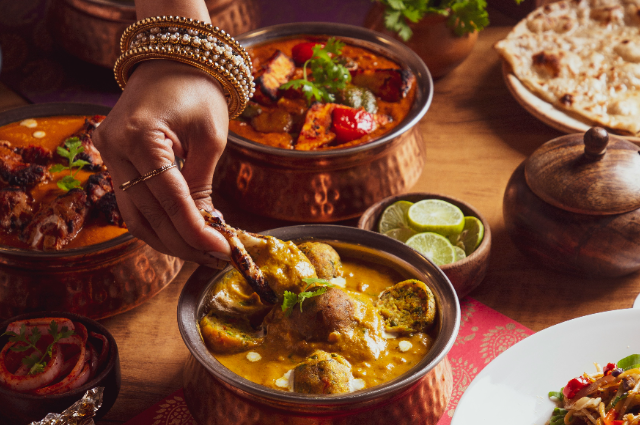
Photo by Perspective Studio on Unsplash
In a moment of immense pride for India, the historic city of Lucknow has been officially designated as a UNESCO Creative City of Gastronomy. The announcement made on World Cities Day, October 31, 2025, during the 43rd session of UNESCO's General Conference in Samarkand, Uzbekistan, marks a significant milestone for the capital of Uttar Pradesh and its centuries-old culinary traditions.
A Historic Recognition
Lucknow becomes the second Indian city to earn this prestigious designation, following Hyderabad's inclusion in 2019. The city now joins 408 cities across more than 100 countries that have been acknowledged for their contributions to creative industries such as crafts and folk art, design, film, gastronomy, literature, media arts, and music.
UNESCO Director-General Audrey Azoulay's decision to include 58 new cities in the Creative Cities Network this year reflects a growing recognition of how culture and creativity serve as concrete drivers of sustainable urban development. For Lucknow, this honour is more than symbolic and it represents global acknowledgment of a culinary heritage that has been perfected over centuries.
The Soul of Awadhi Cuisine
Rooted deeply in Awadhi traditions, Lucknow's cuisine has evolved over centuries, influenced by Mughal kitchens and refined by generations of Nawabi chefs. The city's gastronomic identity is inseparable from its historical and cultural evolution. The Awadhi region, situated in the heart of the Gangetic plains, came under Mughal influence in the 16th century and later flourished under the Nawabs of Awadh in the 18th century.
What sets Lucknow apart is not merely the diversity of its dishes but the philosophy embedded in its culinary practices. The city's food is a perfect blend of artistry and hospitality, symbolizing patience, precision, and passion. From the velvety Galouti kebabs that literally melt in the mouth to the delicately spiced Awadhi biryani and the ethereal Makkhan Malai, each dish tells a story of refinement and innovation.
The traditional cooking technique of dum purdah—slow cooking in sealed vessels over low heat exemplifies the patience and attention to detail that characterizes Awadhi cuisine. This method allows flavors to develop gradually, creating dishes with remarkable depth and complexity. The result is a culinary tradition that transforms cooking into an art form and dining into a cultural experience.
From Royal Kitchens to Street Corners
Lucknow's gastronomic landscape spans the entire spectrum from royal cuisine to beloved street food. On misty mornings in Aminabad, the sizzle of kebabs mingles with the aroma of ghee, cardamom and coal smoke, as street vendors call out orders for galawati and cooks stir pots of nihari with practiced rhythm.
Iconic eateries like Tunday Kababi in Aminabad stand as culinary landmarks, preserving recipes that have been passed down through generations. These establishments are not merely restaurants—they are living museums of culinary heritage, where ancient techniques continue to thrive in the modern era.
The city's famed chaat culture represents another facet of its culinary diversity. From tangy basket chaat to the creamy dahi vada, Lucknow's street food scene demonstrates how sophistication can coexist with accessibility, making exceptional food available to people from all walks of life.
National Pride and Global Recognition
The UNESCO designation has garnered enthusiastic responses from India's highest leadership. Prime Minister Narendra Modi expressed his delight on social media, noting that Lucknow is synonymous with vibrant culture, at its core a great culinary culture. He extended an invitation to people worldwide to visit Lucknow and discover its uniqueness.
Union Culture Minister Gajendra Singh Shekhawat described the recognition as a tribute to the city's exceptional contribution to India's gastronomic legacy, while Chief Minister Yogi Adityanath hailed it as a reflection of India's growing cultural prominence on the world stage.
Tim Curtis, Director and Representative of UNESCO Regional Office for South Asia, emphasized that Lucknow's recognition is a testament to its deep-rooted culinary traditions and vibrant food ecosystem, opening new avenues for international collaboration.
Economic and Tourism Implications
The UNESCO designation arrives at an opportune moment for Lucknow's tourism sector. The city attracted over 8.27 million visitors in 2024, and tourism officials expect even higher numbers in 2025, reflecting its growing international appeal as a culinary destination.
This recognition is expected to catalyze food-led tourism circuits, support small food entrepreneurs, and enhance heritage conservation efforts. The designation provides a framework for sustainable development that leverages Lucknow's culinary assets while preserving their authenticity for future generations.
Celebrity chef Ranveer Brar, a proud native of Lucknow, captured the sentiment perfectly when he stated that this recognition is not just about food—it's about preserving authenticity and sharing culture with the world.
Preserving Living Heritage
Lucknow's inclusion in the UNESCO Creative Cities Network reaffirms that its real royalty lies not in palaces but in its kitchens. The city's slow-cooked dum delicacies, delicate flavors, and timeless recipes represent more than cuisine—they embody India's living heritage and cultural soul.
This designation brings with it a responsibility to document, preserve, and promote these culinary traditions. Recent initiatives, such as exhibits recreating traditional Lakhnavi kitchens and displaying historical cooking vessels and utensils, demonstrate growing awareness of food heritage as material culture worthy of scholarly attention and conservation.
As Lucknow takes its place among the world's recognized gastronomic capitals, it carries forward a legacy that began in royal courts and continues in bustling street corners. The UNESCO Creative City designation ensures that the flavors, techniques, and traditions that define Awadhi cuisine will continue to enchant future generations, both in India and around the world.
. . .
References:
